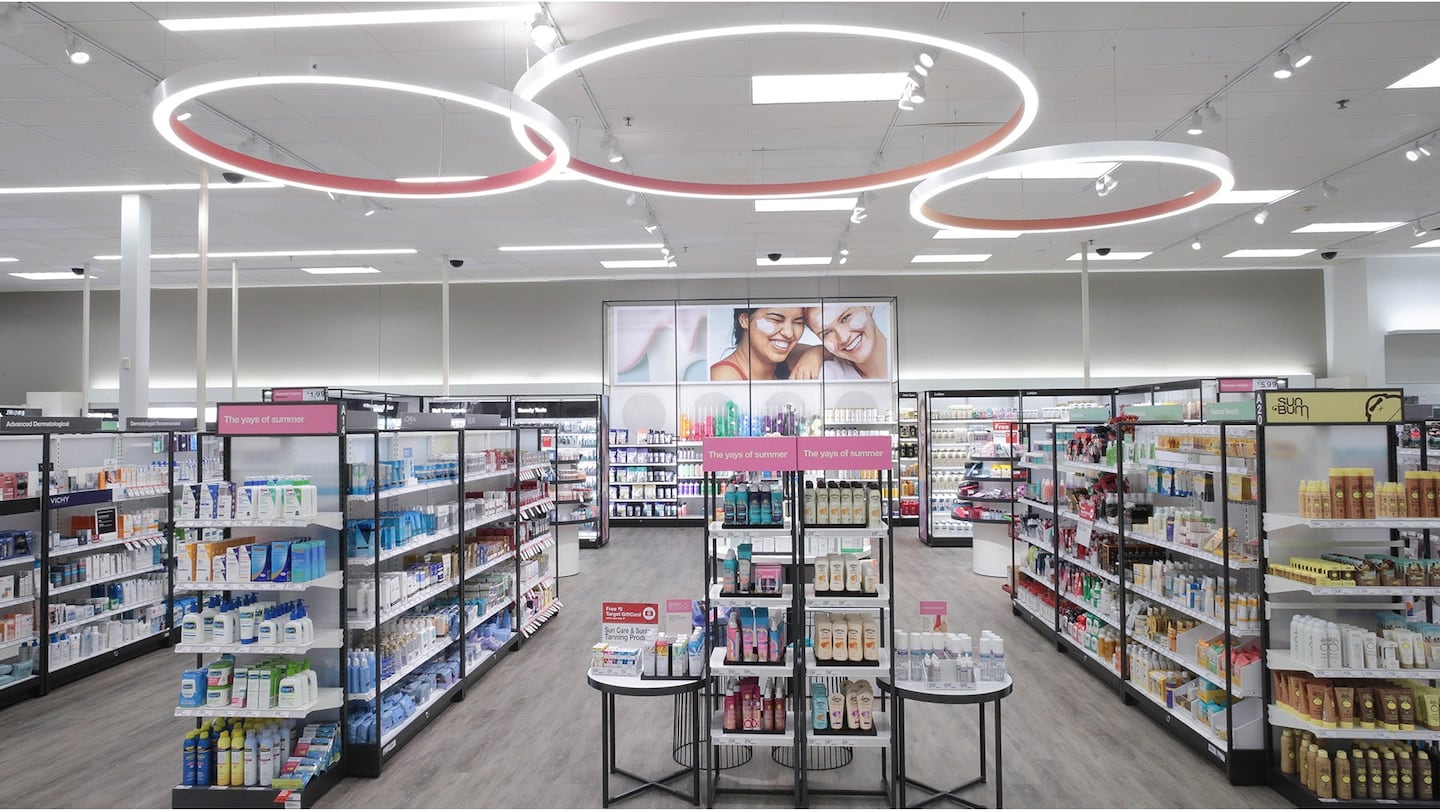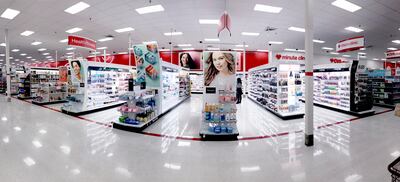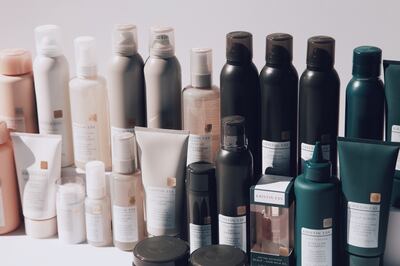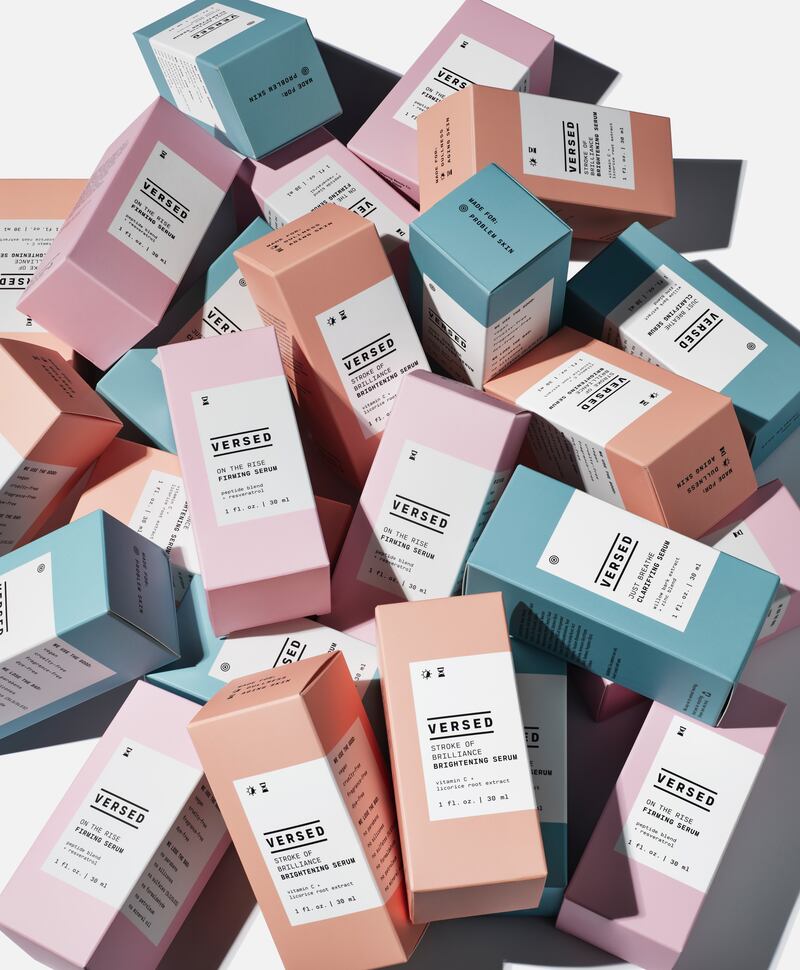
The Business of Fashion
Agenda-setting intelligence, analysis and advice for the global fashion community.

Agenda-setting intelligence, analysis and advice for the global fashion community.

Welcome to BoF's Beauty Newsletter, featuring members-only analysis and the week's top news from the front lines of the global beauty business. Subscribe here.
When shoppers steer their carts into Target’s new beauty aisle on the hunt for sunscreen, they’ll still find the usual shelves lined with Coppertone and Banana Boat. But they’ll have to push past a punchy “the yays of summer” display featuring Tanologist’s iridescent bottles of self-tanner and Bare Republic’s “sparkling rose shimmer lotion” first.
Target is in the middle of the biggest overhaul of its beauty department in years. Over the next year, hundreds of stores will swap out generic grooming and personal care aisles for sleeker displays. The items for sale are turning over as well, with more space dedicated to direct to consumer labels available only at the retailer, as well as a growing list of private-label products.
The revamp is Target's play for a space where big-box retail has historically never had a seat at the table. "The yays of summer" wouldn't be out of place at Sephora or Ulta, which regularly duke it out for exclusive rights to the buzziest new products from celebrities like Rihanna and Kylie Jenner, and try to make shopping in their stores feel like an experience rather than a chore. Both chains have grown rapidly in recent years, stealing market share from department stores, drugstores and big chains like Target.
ADVERTISEMENT
Target sold $18 billion worth of beauty products and household essentials last year, more than Ulta and Sephora combined. But those sales are largely driven by shoppers tossing Dove soap or Pantene shampoo into their carts on their way from pet food to cleaning supplies. Amazon and Walmart increasingly dominate that territory, where they can offer lower prices and faster shipping.

Target's standard beauty format from 2016 and earlier. | Source: Courtesy
The specialty beauty market, where customers are looking for well-designed products at low prices, is a more logical fit for Target, which helped pioneer the high-low retail concept with its designer fashion collaborations in the 2000s.
“Target can give an Ulta a run for their money,” said Laura Gurski, senior managing director and global lead for Accenture’s Consumer Goods & Services practice. “They’re not trying to field Walmart’s customer.”
The remodel was years in the making.
Starting in 2016, Target began signing distribution deals with a host of small beauty brands, including some that had previously only sold online. Today, the retailer is the only place to check out Flamingo razors and wax strips in stores, or Queen V, which makes “Swipe Right” pH-balanced wipes and other feminine care products. Kristin Ess, an influencer, launched her haircare line at Target in 2017, and on track to hit $100 million in global sales this year.
What the new brands have in common is that they are popular with young consumers. And they’re cheap: a Flamingo razor cartridge costs $2.25, compared with the approximately $4.50 Gillette charges per cartridge.
Next up was building a space where shoppers would want to stop and look at unfamiliar products. As recently as 2016, Target beauty aisles had the same high shelves and bright white colour palette seen in drugstores and Walmart. A 2017 renovation that coincided with the introduction of direct-to-consumer brands like Harry’s and Quip lowered the shelf height and opened up the selling space.
ADVERTISEMENT

Influencer Kristin Ess' haircare line is exclusive to Target in the US | Source: Courtesy
The new format, already installed at a handful of stores, marks a more radical departure. The aisles are even wider, with fixtures and lighting to differentiate it from other parts of the store. Additional staff will be assigned to the section to encourage sampling and conduct demonstrations. Products are displayed by category - cosmetics, skincare, body care and hair care.
In other words, it’s a miniature Ulta where you can also buy potato chips and a lawnmower.
“[It’s gone] from a very heavy replenishment-based business where guests would come in … and go get their Neutrogena makeup remover wipes and a very functional layout to one that we’ve worked to balance between discovery and inspiration,” said Christina Hennington, Target’s senior vice president and general merchandise manager of essentials, beauty, hardlines and services.
Target has the look down, but nailing the right assortment of products may prove trickier. Sephora has the exclusive distribution rights to Fenty Beauty and Marc Jacobs Beauty, among other top brands, while Ulta has Morphe and Colourpop, two of the hottest labels on Instagram.
None of Target’s exclusive brands have achieved the same cult status. The retailer has had plenty of hits, including Kristin Ess’ haircare line and Harry’s. Hennington said Target, which has 1,849 locations, can make a strong case to be the exclusive home to promising DTC brands.
“The assortment has evolved quite a bit and that’s helping us accelerate our market share, accelerate our relevance,” said Hennington. “All these [direct to consumer] brands are winning in the direct to consumer market but need a partner to figure out how to operate in the brick and mortar channel.”
Target hopes its hybrid beauty strategy — straddling the line between big-box and specialty retailer — could be its biggest competitive advantage. The retailer’s assortment is tailored to appeal to a Walmart or a Sephora customer.
ADVERTISEMENT
So far, the approach is working. Beauty has experienced mid-single digit growth in total sales and market share gains every year since 2016, said Mark Tritton, Target’s executive vice president and chief merchandising officer. Overall, sales for the first quarter grew 5.1 percent year over year.
“Our goal is to provide a differentiated experience,” Tritton said. “A guest can come and shop beauty, pick up her Maybelline mascara and discover a new brand or item, like Versed or Flamingo.”

Versed, a new clean skincare line available at Target | Source: Courtesy
Target is facing pressure from all sides as it captures a growing share of the beauty market. Department stores are making over their beauty counters in a bid to regain some of the foot traffic they’ve lost to Ulta, while the specialty retailer is signing more Gen Z favourites like Lime Crime to exclusive deals. Amazon is also making inroads, launching two private labels earlier this year.
For Target, a stable of cool private label brands (budget personal care line Smartly, household label Ever Spring and Good Fellow & Co all launched recently) could make them less reliant on signing exclusives. Good Fellow & Co, a men's grooming label that debuted in May, is meant to mimic the prestige feel and aesthetic of Aesop at roughly one-tenth the price. Campaign imagery for the products, which include Moroccan Mint & Cedar Face Scrub and Spiced Ginger & Rum Beard Oil, feature bearded hipsters. There's even a distressed, vegan leather trimmed dopp kit for sale.
“You can innovate and create a product that’s the Rolls Royce [of beauty] but it’s going to sell for a really high price point and not every consumer be able to purchase and enjoy that product,” said Josh Goldin, co-founder and managing partner at Alliance Consumer Growth, an investor in Pacifica and Harry’s. “What retailers like Target are doing…[is] enabling innovation and newness...at a price point that a lot of people can afford.”
Products from Target’s growing private label business are developed at the company’s headquarters, a sprawling four-building campus that has its own bank, dry cleaner and doctor, as well as a nearly 100,000-square-foot “mock store” where retail concepts are “mocked up” as far as 18 months in advance.
Doors lining a long highway lead to rooms devoted to each of Target’s private labels, from Smartly to Ever Spring. The walls of Good Fellow & Co’s room were plastered with photos meant to inspire the designers, campaign imagery and yet-to-be-released products.
At “Guest Central,” a room with eight giant screens affixed to one wall, a team spends their days observing what people are saying about Target on social media. One screen blasts the news and another has a heat map of the conversation on Twitter. Others contain keywords and hashtags or user-generated content.
In a nearby lab, a staffer was testing new scents for holiday body washes to ensure they produced the right amount of foam. Various liquids were heated in plastic beakers, and the amount of foam as well as how long it took to dissipate was dutifully recorded. Nearby, a group reviewed Target’s fragrance strategy, poring over “scent profiles” amid walls of colour wheels and mood boards.
“We’re not in the business of building private labels – we’re in the business of building brands,” she said. “We put as much effort into building a brand as an external brand might put into building their brands.”
THIS WEEK IN BEAUTY
Pat McGrath is a hit at Selfridges. In a month, Pat McGrath Labs has become the retailer's bestselling beauty line.
Sephora closes for the day. In response to Sza tweeting about a Sephora staff member thinking she was stealing, the retailer closed its stores Wednesday to host diversity training.
Olay will sell refillable products. The P&G-owned brand will sell a refillable pod with each jar of its Regenerist Whip moisturiser starting in October.
This founder wants to empower women of colour. Abena Boamah is the creator of Hanahana Beauty, a direct to consumer skincare brand that sources ingredients from Ghana.
Honest Company vet wants to rebrand CBD. Christopher Gavigan, who co-founded The Honest Company with Jessica Alba, wants to normalize CBD with new line Prima.
Amazon will implement augmented reality. The e-tailer will use ModiFace's technology to allow customers to virtually "try-on" lipstick.
Founders talk dupes. Beauty founders discuss the "rampant copying" proliferating the indie beauty space.
Welcome to the age of the "Mammoglam." Mammogram clinics are trying to make the procedure more appealing with beverage bars, sound baths and warm robes.
From analysis of the global fashion and beauty industries to career and personal advice, BoF’s founder and CEO, Imran Amed, will be answering your questions on Sunday, February 18, 2024 during London Fashion Week.
The State of Fashion 2024 breaks down the 10 themes that will define the industry in the year ahead.
Imran Amed reviews the most important fashion stories of the year and shares his predictions on what this means for the industry in 2024.
After three days of inspiring talks, guests closed out BoF’s gathering for big thinkers with a black tie gala followed by an intimate performance from Rita Ora — guest starring Billy Porter.